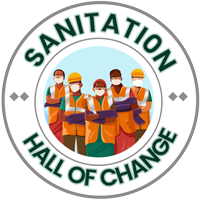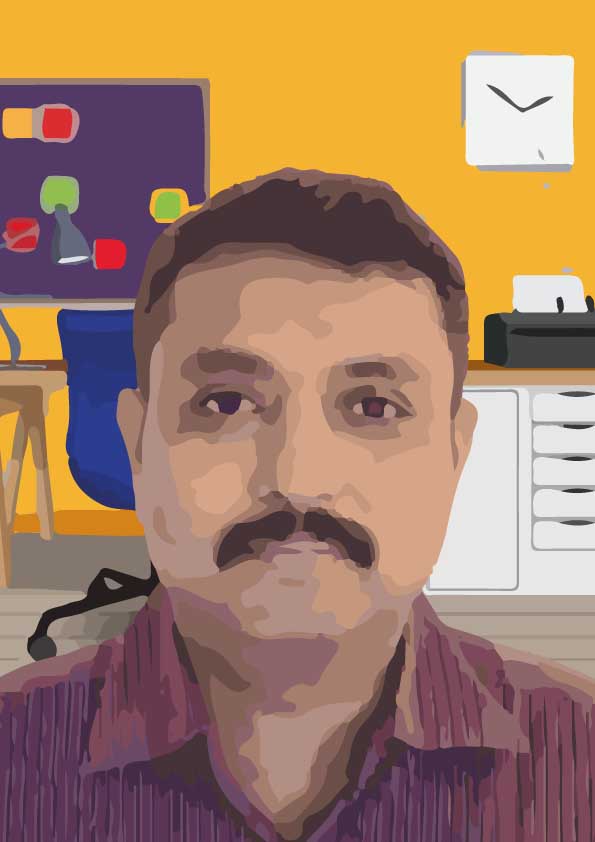Subrata Chakraborty, a Senior Programme Manager in the Water Programme at CSE, began his journey from the bustling urban streets of Kolkata. A Master's degree in economics in 1999 marked the start of Subrata’s career in the social development sector. In his early years he was working with an NGO in eastern India, primarily focusing on education and integration. As time passed, he ventured into rural development, working with the Panchayati Raj Institutions and Rural Development Departments. These initial experiences offered him an eye-opening realization about the disparities in accessing clean water and sanitation between urban and rural areas.
Growing up in Kolkata, Subrata assumed that amenities like clean drinking water and proper sanitation were available for most citizens. However, his perspective shifted drastically once he started working in the sector and moved to rural areas where these basic necessities were scarce. The experience of witnessing the challenges people faced in rural communities left an indelible mark on Subrata. He spent the next 11 years dedicated to improving sanitation and water resources. These efforts allowed him to understand the complex challenges of sanitation, including issues related to toilets, clean water, and wastewater management. His work in areas grappling with problems like arsenic contamination, high salinity, and inadequate sanitation facilities led to profound insights and motivation.
In 2016, Subrata transitioned to becoming a consultant at the World Bank, where he played a pivotal role in supporting the governments of West Bengal, Chhattisgarh, Jharkhand, and Haryana in implementing sanitation initiatives. Throughout his journey, Subrata has collected anecdotes that shed light on the behavioral aspects of sanitation. He shared a story from 2017 when he was working in a village in Purulia, West Bengal. Subrata assumed that toilet usage would solve challenges of privacy that rural communities have faced due to open defecation. Hence, to promote toilet usage, Subrata had encouraged the installation of doors for privacy. However, he was surprised to discover that the villagers had placed steel see-through grills on the toilet cubicles instead of solid doors. Recognizing this disparity, it became imperative for him not only to gain a deeper understanding of their challenges, rooted in systemic inequalities, but also to initiate conversations with them. Addressing concepts of rights and privacy became crucial in empowering these communities to lead improved lives.
His journey from integrated village development to the sanitation sector was marked by his vision for a holistic approach to sanitation where he broadened his focus to include fecal sludge management, greywater management, blackwater management, and solid waste management, recognizing that sanitation extended far beyond just building toilets. However, the onset of the COVID-19 pandemic prompted Subrata to return to Kolkata and take on a new opportunity with the Centre for Science and Environment (CSE). At CSE, he leads the Water Programme, a position that allowed him to make an impact not only on sanitation but also water management, lake rejuvenation, and solid waste management. Subrata's work at CSE underscores the holistic approach to sanitation he has consistently advocated for.
Subrata emphasizes 3 key aspects to inclusive sanitation. First, he believes that sanitation should be accessible to all people, irrespective of the marginalization they face from society and their communities. Second, he stressed on the importance of ensuring equitable and affordable services. The economics of pricing for various sanitation services was a significant consideration. Finally, Subrata highlighted the interconnectedness of sanitation with broader development goals, including water management, climate initiatives, and employment generation under the Mahatma Gandhi National Rural Employment Guarantee Act (MGNREGA).
As part of CSE, Subrata also got the opportunity to be a part of the the National Faecal Sludge and Septage Management (NFSSM) Alliance. He found the alliance to be a community of like-minded individuals who come together to address common and complex challenges in the sanitation sector. He appreciates the culture of mutual learning and shared advocacy tools developed by the Alliance. He recalls his experiences working with government officials from Odisha and Tamil Nadu. These interactions allowed him to coordinate efforts with organizations like the Institute for Housing and Urban Development Studies (IHS), Erasmus University Rotterdam, to promote collaborative learning. This collaboration extended to supporting government officials from different states in their visits.
Subrata's vision for the sanitation sector is to address the challenge of sustaining sanitation infrastructure and ensure that the institutional and regulatory frameworks are strengthened. He aims to enhance people's participation and build a robust regulatory structure to make the infrastructure operationally sustainable. Subrata Chakraborty's journey in the sanitation sector is a testament to his commitment and the transformative power of holistic approaches to address India's sanitation challenges. His work at CSE and contributions to the NFSSM Alliance continue to drive positive change in the field of sanitation.

